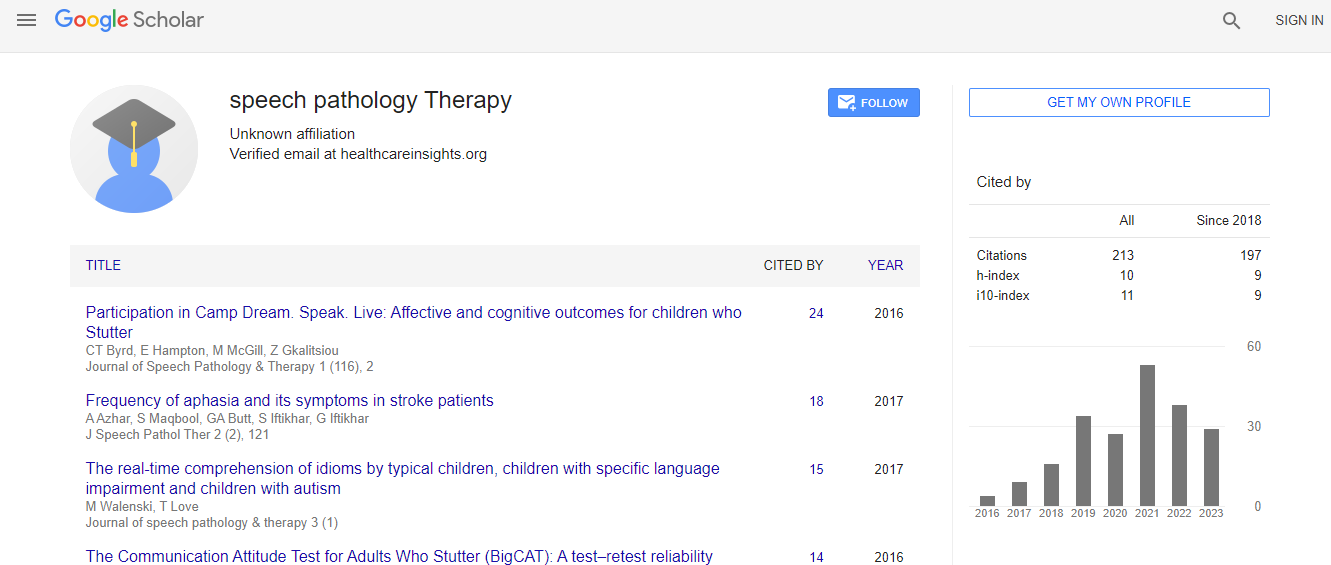Our Group organises 3000+ Global Conferenceseries Events every year across USA, Europe & Asia with support from 1000 more scientific Societies and Publishes 700+ Open Access Journals which contains over 50000 eminent personalities, reputed scientists as editorial board members.
Open Access Journals gaining more Readers and Citations
700 Journals and 15,000,000 Readers Each Journal is getting 25,000+ Readers
Google Scholar citation report
Citations : 273
Journal of Speech Pathology & Therapy received 273 citations as per Google Scholar report
Indexed In
- Google Scholar
- Open J Gate
- RefSeek
- Hamdard University
- EBSCO A-Z
- Euro Pub
- ICMJE
Useful Links
Recommended Journals
Related Subjects
Share This Page
Toddlers working memory: Toward an early identification of toddlers at risk for language disorders
International Conference on Speech Language Pathology
France Weill
Touro College, USA
Keynote: J Speech Pathol Ther
Abstract
Introduction: The ability of children to learn new words at a very fast pace and with minimal exposure develops during their second year of life and depends on working memory and on existing word knowledge. Aim: To identify toddlers at risk for language disorders. Methods: Subjects for this study included 44 typically developing, monolingual English speaking toddlers ranging in age from 24 to 30 months. Children were recruited from local communities through recruitment fliers posted in daycare centers and businesses and through recruitment e-mails posted on local list serves. All subjects enrolled in the study were from New York City or from Bergen County, NJ. Measure of Vocabulary Size: Vocabulary size was assessed through the Mac Arthur Communicative Development Index (MCDI), a parental questionnaire considered a valid and reliable instrument for measuring children√ʬ?¬?s language development. The MCDI examines many aspects of early language development: Use of gestures, play, acquisition of vocabulary and development of syntax and of sentences. It provides separate receptive and expressive language scores. However, in the context of this research, only the Expressive Vocabulary Checklist of the Toddler√ʬ?¬?s version of the MCDI (MCDI-T) was used for measuring vocabulary size. The MCDI-T is considered to give an accurate account of size of vocabulary, as reported by the parents. Results: Nineteen (19) children provided a complete set of data for this study, ranging in age from 24 to 30 months (M=26.3, SD=1.8). Results showed a statistically significant moderate to strong correlation (r=0.71, p<0.01) between the phonological loop capacity and the size of productive vocabulary. Visual inspection suggested that no outlier was present in this sample. Discussion: Our study showed that toddlers 24 to 30 months-old with a large phonological loop capacity tend to have a larger vocabulary than toddlers with a small phonological loop capacity. As the phonological loop mediates word learning and vocabulary development, our findings suggests that children with better verbal working memory are more efficient in remembering words they have never heard before. Our findings are further supported by the findings of Stockes (2009), who showed that the strongest predictor to vocabulary knowledge is phonological loop capacity in toddlers 24 to 30 months. Hoff, Core and Bridges (2008) bring a longitudinal perspective to our hypothesis by showing that phonological loop capacity and vocabulary development are closely related in 20 to 24 months old toddlers.Biography
France Weill is an Associate Professor at the Graduate School of Speech Language Pathology at Touro College, NY. She holds a professional license both in New Jersey and New York State. Previously, she has worked as a speech language pathologist in Israel for 5 years, established and directed a large college-based speech and language clinic, and maintained an active private practice in Jerusalem. Besides her academic work, she is currently running a private practice in Teaneck, NJ and serving as consultant in various French-American schools and programs. She is regularly running professional workshops related to language, play and cognition. Her research interests include the role of memory in language development of toddlers. She has extensive clinical and teaching experience in the areas of early language development, the role of cognition and metacognition in learning, play and language, Autism Spectrum Disorders, online education and implementation of EMR in professional training programs. She is fluent in French, English and Hebrew. France.
Email: Weill@touro.edu
 Spanish
Spanish  Chinese
Chinese  Russian
Russian  German
German  French
French  Japanese
Japanese  Portuguese
Portuguese  Hindi
Hindi 